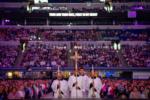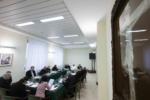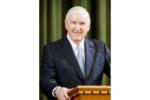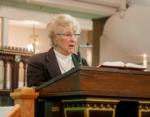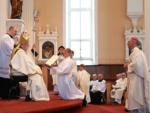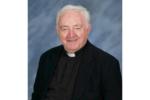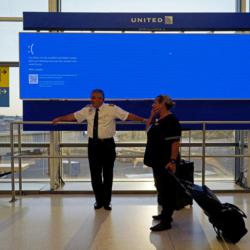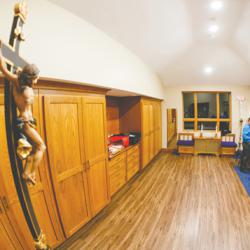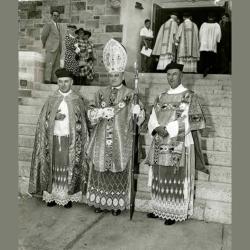Thousands gather for 'Jesus Is Here' Eucharistic Congress
LOWELL -- On June 18, the long-awaited "Jesus is Here" Archdiocesan Eucharistic Congress drew over 3,000 people for a day filled with praise and worship, Mass and adoration, talks from renowned speakers, and a eucharistic procession through the streets of Lowell.
The archdiocese had been planning this event since 2019, when Cardinal Seán P. O'Malley declared his intention to hold a Year of the Eucharist. He was prompted to do so after a study by the Pew Research Center revealed survey data indicating that most Catholics either do not understand or do not believe in the Church's teaching that Christ is truly present in the Eucharist. This special year, dedicated to celebrating and educating about the eucharistic faith, was extended from 2020 to 2022 in light of the coronavirus pandemic. After being postponed from its original 2021 date, the Eucharistic Congress marked the end of the Year of the Eucharist.
The daylong event took place June 18 at the Tsongas Center. Music was provided by Village Lights, and Wendy Mejia and Bishop Robert Reed served as masters of ceremonies. Different Catholic organizations had exhibitor booths for people to visit during breaks, and confessions were also available for certain periods throughout the day.
The congress began with a Mass celebrated by Cardinal O'Malley at which Bishop Mark O'Connell, the auxiliary bishop of the North Region, served as the homilist.
Bishop O'Connell spoke about the original announcement of the Year of the Eucharist in 2019 and the intervening period of lockdown in 2020. During that time, the archdiocese suspended public Masses for 10 weeks.
"Despite all we have been through, Jesus has accompanied us. Despite the long Good Friday of COVID, during the lockdown, for so many of us, the absence of receiving the Eucharist weekly or daily only increased our devotion," Bishop O'Connell said.
He also spoke about the essential workers who continued to show up and do their jobs while everyone else remained quarantined. In his parish, St. Theresa's in North Reading, they placed a monstrance with the Blessed Sacrament in the window of the rectory, and people came in their cars to worship from the parking lot. Bishop O'Connell said that like Elijah in the desert, they were strengthened for their journey by this food.
"Today, as we are so privileged to be together," he said, "let us appreciate this community of persons."
The meaning of the Mass
The first speaker of the day was Deacon Harold Burke-Sivers, an internationally renowned speaker and author who has hosted several series on EWTN.
Deacon Burke-Sivers said that the Eucharist "gives us the perseverance and fortitude to stand up for the convictions and truths of our faith so that we can be the disciples who Christ created and calls us to be."
"The Eucharist is not just important to evangelization, the Eucharist is evangelization," he declared.
He spoke about the "polyvalent meaning," or multiple layers of meaning, of what happens during the Mass -- such as when a drop of water is added to the cup of wine about to be consecrated. One layer of symbolism is that the drop of water represents the Church's offering being united with Christ's -- and once it is added, it cannot be removed.
"In that eucharistic sacrifice, our intimacy and union with God is so personal, we are so united with him, we are so at one with him, that we cannot separate our lives from him," Deacon Burke-Sivers said.
He recalled an interaction with an atheist professor at a university where he was speaking. This professor taught Greek, and Deacon Burke-Sivers asked him to explain the original linguistic meaning of Luke 22:19-20, when Jesus blesses and distributes the bread and wine at the Last Supper. The professor said that the subject of the sentence, Jesus, was making "an absolute identification" with the object, first bread and then wine. Deacon Burke-Sivers asked if it could be read as a metaphor, and the professor said absolutely not.
Deacon Burke-Sivers also spoke about the Jewish observance of Passover, which is not seen as merely a remembrance of a historic event but as a participation in that event. He explained that Jesus used the same language at the Last Supper.
"The same graces and the same blessings that flowed from that cross are made real and present on that altar at every single Mass. We are actually at Calvary," Deacon Burke-Sivers said.
He also spoke about the U.S. bishops' three-year Eucharistic Revival, which was to begin the following day on the feast of Corpus Christi and continue until 2024. He encouraged everyone to "use this time to truly get back to a proper understanding, to learn, to experience the depth of God's love in that most Blessed Sacrament. Get to know our Lord deeply, personally, and intimately."
"After we receive him, word and sacrament in the holy sacrifice of the Mass, our job is to go forward to be Eucharist to the world, to show somebody Jesus," Deacon Burke-Sivers said.
Living moments of salvation
In his talk, titled "Mass as Participation in the Work of Jesus," Bishop Daniel Flores of Brownsville, Texas, presented four moments in the life of Jesus that are lived during the celebration of the Mass.
The first moment, Bishop Flores said, is when "Jesus calls his people together." Igniting in them a desire to hear his word and receive his healing, people came to him, he said.
"So, the first moment at Mass is when each one of us arrives, passes through the parish doors, and enters. All of us are leading different lives, but we enter looking for something only Jesus can give us," Bishop Flores said.
The second moment is "Jesus forms his people." Jesus taught his people through his acts of healing, expelling demons, of feeding the hungry, which were a manifestation of this formation. Through the beatitudes and parables, Jesus, a compassionate being, formed his people also to be compassionate -- and to be in communion with him and with each other.
The third moment is when Christ "gives himself for us." Bishop Flores said that it is ultimately his sacrifice that allows us Catholics to understand his teaching and what he meant with the parables featured in the Gospels.
The final moment, he said, is "Jesus sends his people." This is what the disciples experienced, and he calls us to experience it as well, only if we want to. Bishop Flores said Jesus remains active in his quest to make us participate in his work, to bring people to him, form them in him, and feed people with what Jesus taught.
"We need to come out of Mass more as a community and less as individuals ... because Mass has the power to transform us, little by little, but in a profound way," Bishop Flores said.
The eucharistic banquet
When the assembly reconvened after lunch, Cardinal O'Malley invited a special guest, Cardinal Antoine Kambanda, archbishop of Kigali, Rwanda, to share a few words.
Cardinal Kambanda remarked on how providential it was to be there, pointing out that an international eucharistic congress had taken place in Budapest the year before, and Rwanda had held a national eucharistic congress in December.
He spoke about the symbolism of Jesus as the vine and his disciples as the branches.
"A branch cannot live or bear fruits if it is detached from the vine. The Eucharist keeps us attached like live branches in order to bear fruits," Cardinal Kambanda said.
Following Cardinal Kambanda's remarks, Cardinal O'Malley took to the podium to deliver the first address of the afternoon session.
He called the Eucharist "God's invention," which "manifests the ingenuity of a wisdom that is, at the same time, the foolishness of love."
"Everything in the Eucharist derives from love carried to the extreme. All emerges from a limitless will to give," Cardinal O'Malley said.
He spoke about the parable of the wedding feast in Matthew 22. He explained that the Eucharist is a wedding feast, and the Mass is a celebration of Jesus' love.
"God is sending us, his servants, out to invite everyone to the banquet. 'Come to the feast, everything is ready' must be our message," Cardinal O'Malley said.
Christ the Bridegroom
The final speakers were a married couple, Jackie and Bobby Angel, who have created content for Word on Fire and Ascension Presents. Each spoke in turn about how God's relationship with humanity is like the love of a bride and bridegroom, which they said is the most used analogy in the Bible.
"Once you've been brought beyond the threshold of 'It's just rules, it's just a moral way to live life,' to 'it is a profound love story that God is proposing,' you can't go back, because love makes you do crazy things," said Bobby Angel, a former theology teacher.
He said that the Eucharist "makes no sense unless you're looking at it through the eyes of love."
"We can get caught up in the theology, we can get caught up in words like 'transubstantiation,' but the basic posture has to be one of gratitude. This is a story of love, of God's love for us," he said.
Jackie Angel, a singer-songwriter, said that just as there are many forms of intimacy between two people, there are many ways of being intimate with God, and the most intimate on Earth is through the Eucharist.
She also spoke about how she and her husband made Jesus the foundation of their marriage, and how they are teaching the faith to their four children. She said they teach their children that faith is not about rules, but about having a relationship with God.
"We want our children to know that this love story is worth everything," she said.
Eucharistic procession
The congress closed with a period of eucharistic adoration followed by a procession through the streets of Lowell. Several hundred conference participants followed a large group of priests and deacons as the Blessed Sacrament was brought in procession from the Tsongas Center to St. Patrick Church several blocks away.
As the crowd filled the lawn in front of the church, Cardinal O'Malley concluded the procession with benediction at an altar placed outside the front doors of the church.
The Blessed Sacrament was carried in a monstrance that was originally from the former St. Peter Parish in Lowell but had passed from one community to another as parishes closed and pastors were reassigned. The monstrance was to stay at St. Patrick Parish after the congress, returning it to the Catholic faithful in its city of origin.
Liz Cotrupi, the archdiocese's director of family life and ecclesial movements, expressed gratitude for all the volunteers who helped make the Eucharistic Congress happen.
"Without them we could never have hosted this event," she said.
Barbara Keville, who helped publicize the congress and served as a lector during the Mass, said it was "very joyous" and "exciting." She said that everyone she spoke with loved it.
"It was absolutely wonderful," she said.
GREGORY L. TRACY CONTRIBUTED TO THIS REPORT.


